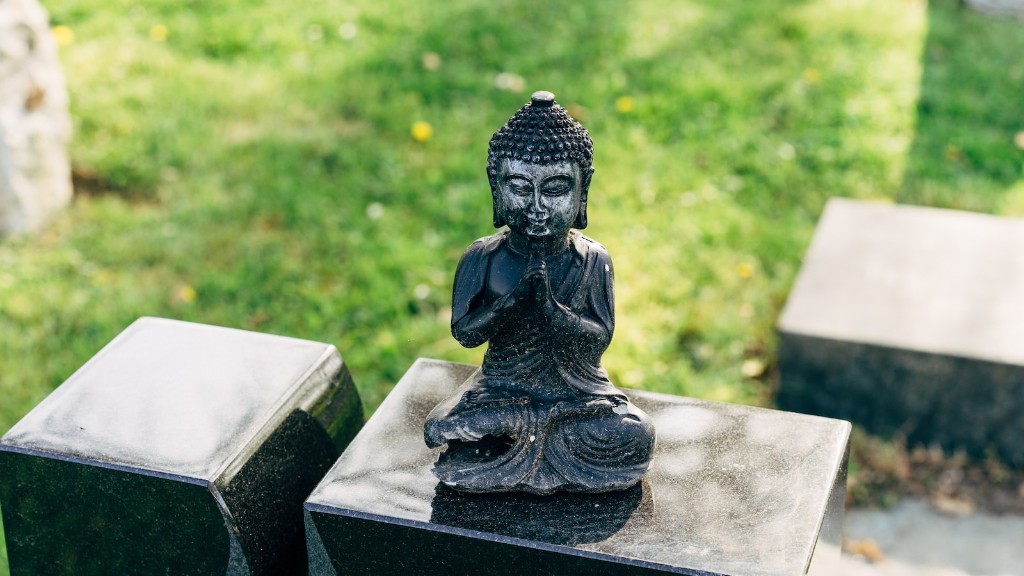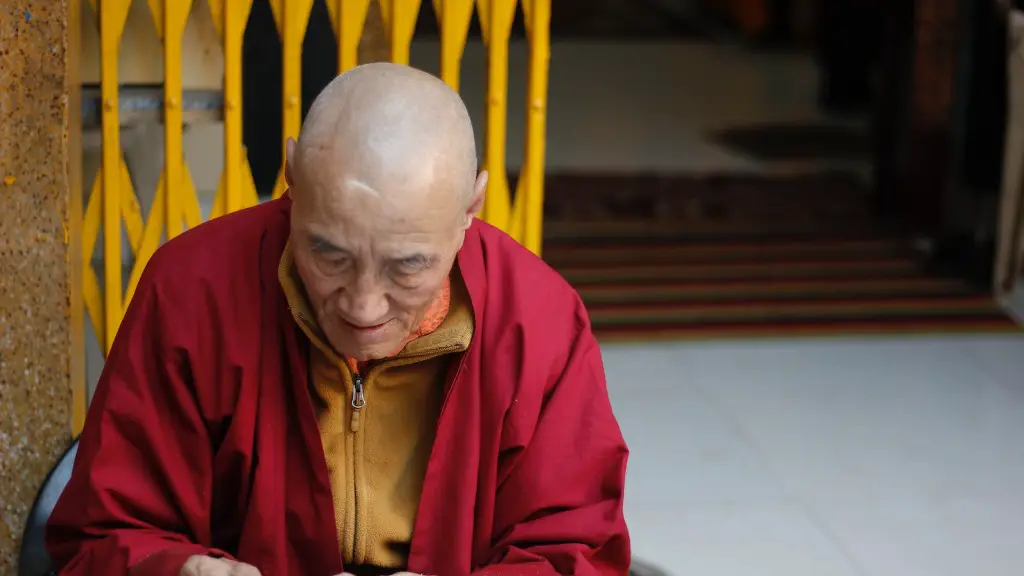Hinduism and India
Hinduism is one of the oldest religions in the world with a rich and varied history. It is often seen as one of the dominant beliefs in India, and has been for centuries; however, the history of Hinduism is complex and there is debate involving the question of whether it originated in India. The answer to this question is dependent on a variety of elements, making the subject complex and interesting to discuss.
It is believed that the beliefs and practices of Hinduism have been around for more than 4,000 years. This is largely due to archaeological evidence, such as the construction of temples, monuments and artifacts in various parts of India, as well as the Vedic literature, which dates back to 1000 BC. Some scholars have argued that the origins of Hinduism are much older, citing sources as far back as 8,000 years or more.
Although the exact origins of Hinduism are highly contested, most experts agree that the core beliefs of Hinduism can be traced back to India. The earliest records of the religion come from the Indus River region, the first known human settlement in India. Excavations of the region have revealed evidence of religious practices, such as the worship of various gods, animal sacrifices and fertility rituals.
Hinduism has also been shaped by other religions and cultures over the centuries. It has been heavily influenced by Buddhism, Jainism and Sikhism, as well as ancient Persian and Greek cultural traditions. As Hinduism spread throughout South Asia and then the world, it was adapted for new contexts and environments, helping to shape the religion as we know it today.
One of the key elements of Hinduism is the caste system, which is a complex system of social hierarchy. The caste system is believed to have emerged from the Hindu scriptures, the Vedas, which laid down a framework for the organization of society. The Vedic texts also discuss a range of ethical principles and philosophical ideas, which are thought to have directly influenced many aspects of Hinduism.
It is clear that Hinduism is a diverse and evolving religion, and its origins are hotly debated by academics and theologians. Although there is no clear consensus on precisely how it arose, most agree that its roots can be traced back to India, making it one of the most ancient religions still in existence.
Evolution of Hinduism
Hinduism is a complex and ever-changing religion, and its evolution is interesting to explore. The Hindu scriptural texts, the Vedas, are some of the earliest recorded sources of ancient Hindu beliefs and practices. In the Vedic hymns, which are believed to have been composed several thousand years ago, there is evidence of the worship of various gods and goddesses, a reflection of the polytheistic nature of the religion. This period of Hinduism is known as Vedic Hinduism.
In the centuries following the writing of the Vedas, Hinduism underwent a significant evolution. This period is known as the Epic Age and it saw the development of the two great Hindu epics, the Ramayana and the Mahabharata. These two epics provided a foundation for many later Hindu traditions, as well as giving rise to the philosophical tradition of Hinduism known as Vedanta.
In the centuries following the Epic Age, Hinduism continued to evolve and diversify. The Bhakti tradition, for example, was developed in the medieval period and is focused on devotion to a personal deity. In the modern era, Hinduism has seen the emergence of various reform movements, among the most notable being the Arya Samaj movement, which was founded in the 19th century.
The evolution of Hinduism over the centuries has been an impressive process. It has been shaped by a variety of factors, such as contact with other religions, foreign influences and social change. Hinduism has also absorbed and adapted a range of beliefs and practices, leading to an incredibly complex and diverse religion.
Influence of Hinduism Outside of India
Hinduism has a long history and is believed to be one of the oldest religions in the world. It originated in India but, over time, its influence has spread far beyond India’s borders. Hinduism has been taken to different parts of the world by migrants and traders, and today it is one of the most influential religions in the world. The influence of Hinduism can be seen in many parts of Asia, Europe, North and South America, Africa, and Australia.
In many of the countries where Hinduism has taken root, it has been adopted and adapted to local cultures. Different Hindu traditions have emerged in different places, reflecting the diversity of Hinduism itself. For example, in Thailand, Hinduism blended with the existing animist beliefs to form the Siwalai tradition, while in Indonesia Hinduism blended with Buddhist, Confucian and Islamic beliefs to form a unique kind of the religion.
Hinduism has also had a strong impact on the wider culture in many countries. Its concepts, such as karma and reincarnation, have been adopted by many cultures, and its philosophy and art have provided much of the inspiration for many works of literature, film, theatre and music. Hindu influences can also be seen in architecture, with Hindu temples being an iconic feature in many cities.
The influence of Hinduism extends far beyond India, and its influence can be seen in a wide variety of cultures around the world. It is a testament to the power and resilience of Hinduism that it has been able to spread so far and make such an impact in so many places.
Hinduism in the 21st Century
Since the beginning of the 21st century, Hinduism has become increasingly visible in global and contemporary culture. The religion has seen a resurgence in the West, where Hindus have become increasingly vocal and organized in defending their faith. This includes the establishment of temples and religious organizations, as well as campaigns to raise awareness of Hinduism’s roots and values.
In India, Hinduism has been on the rise, with rising levels of national pride, as well as the emerging economic power of the country. This has led to an increased focus on Hindu-based religious rites and festivals, as well as a resurgence of age-old traditions. Hindu symbols and themes can be seen everywhere in India, from movies to advertisements.
In recent years, Hinduism has also been the subject of much debate and controversy. Many of these debates focus on the issues of caste and gender, as well as the place of Hinduism in modern India. The ongoing debate reflects both the dynamism of Hinduism and the ever-evolving nature of the religion.
Hinduism has always been, and remains, one of the most influential religions in the world. In the 21st century, it continues to evolve and adapt to a rapidly changing landscape, making it a fascinating and relevant topic for discussion.
Hinduism and Contemporary Moral and Ethical Issues
One of the key aspects of Hinduism is its focus on morality and ethical values. Hindu scriptures challenge adherents to look within and strive for a balanced life, in harmony with their environment and those around them. To this end, Hinduism provides guidance on a variety of moral and ethical issues and it is important to consider how Hinduism’s teachings can help us to address the moral and ethical challenges of the 21st century.
Hinduism encourages adherents to question authority and to examine their own behavior and motivations in order to make ethical decisions. Hindu scripture teaches a respect for all living beings and a desire to promote harmony and take responsibility for one’s actions. This is exemplified in the principle of ahimsa, or non-violence, which encourages people to respect the rights of others and to live in peace.
The importance of Hinduism’s teachings on morality and ethical issues is increasingly apparent in a 21st century world. In an era of economic globalization, environmental degradation and social injustice, Hinduism’s teachings are as relevant as ever in helping us to make ethical decisions and build a more equitable and sustainable world.
Hinduism is a vast and complex religion, and its teachings on morality and ethics can offer valuable insights into contemporary life. By exploring Hinduism’s rich spiritual heritage and reflecting on its principles, it is possible to move closer to a world in which there is respect for all living beings and a commitment to promoting harmony and justice for all.
Relevance of Hinduism Today
Hinduism is a profoundly influential religion, with a long and complex history. It is often seen as one of the oldest existing religions, with roots in India going back as far as 4,000 years. Despite its long past, Hinduism remains a major religious tradition in the modern world – reflecting the dynamism and resilience of the religion.
Hinduism’s emphasis on personal growth, transformation and spiritual exploration is highly relevant to our increasingly interconnected and complex world. Hinduism offers helpful guidance on ethical decision-making and encourages people to look within to find their true identity and purpose. At a time when traditional values are being challenged, Hinduism provides a powerful religious framework for finding strength and purpose in life.
Hinduism’s commitment to tolerance and pluralism is another aspect of the religion that is worth exploring. The religion is highly tolerant of other belief systems, and its teachings are open to interpretation. This is in stark contrast to many other religions, which rely on a strict interpretation of holy texts and doctrines in order to hold adherents to a certain set of beliefs.
Hinduism’s long history, deep philosophy and spiritual exploration is sure to continue to remain influential in the centuries to come. It is a testament to the power of Hinduism that, in a world of rapid change, its practices and beliefs remain relevant in our lives today.

